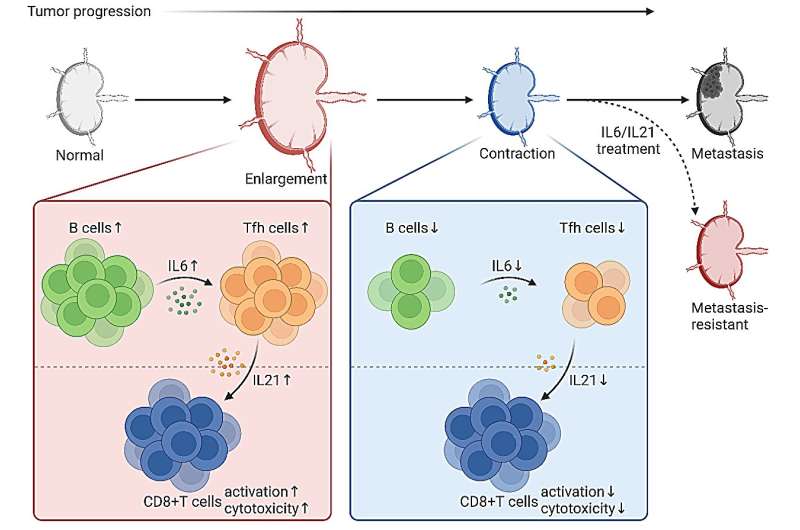This article has been reviewed according to Science X's editorial process and policies. Editors have highlighted the following attributes while ensuring the content's credibility:
fact-checked
peer-reviewed publication
proofread
New therapeutic strategies raised to prevent and resist metastasis in lymph nodes of breast cancer

Metastasis has always been enemy number one in malignant tumors, as it is the primary cause of cancer-related deaths. It is now widely accepted that the so-called pre-metastatic microenvironment, which means a suitable soil for metastatic tumor cells, has already existed in organs before metastasis occurrence. A new study, recently published in Research, reported the dynamic changes in the pre-metastatic microenvironment of lymph nodes of breast cancer, as well as the responsible regulatory mechanisms.
"With the progression of the primary tumor, the tumor-draining lymph node is first enlarged and immune-activated at early stage which contains specific antitumor immunity against metastasis, then contracted and immunosuppressed at late stage before finally metastasized," introduced Shui Wang, the leader of the study.
The interesting phenomenon was discovered in multiple murine breast cancer models and repeatedly verified in clinical settings. Different from the pre-metastatic microenvironments in other organs, the team discovered in lymph nodes a unique enlarged phase before metastasis which represented an immune-activated status completely resistant to metastasis.
The size of lymph nodes from clinical examinations is an important information to evaluate whether the lymph node might be metastatic and should be surgically removed. Since the antitumor immunity and immune memory generated in lymph nodes are known to be crucial for favorable survival as well as response to adjuvant therapies, excision of these enlarged activated lymph nodes is not only unnecessary but also eliminating the source of systemic antitumor immune response.
"Our findings should raise the importance of pathological examination of enlarged lymph nodes by fine needle aspiration instead of direct lymph node dissection, since preservation of uninvolved activated lymph nodes is of remarkable benefits for patients," said Wang.
Based on the phenomenal discoveries above, the regulatory mechanisms were further uncovered. In lymph nodes, B and follicular helper T (Tfh) cells parallel expand and contract to determine the size of the lymph node. The activation status and specific antitumor immunity of CD8+T cells in the lymph nodes are determined by interleukin 21 (IL21) produced by Tfh cells, thus showing parallel changes. The turn from activated enlargement to suppressed contraction is due to the spontaneous contraction of germinal centers mediated by follicular regulatory T cells.
In conclusion, the dynamic changes in size and immune status of the lymph nodes are regulated and determined by the B-Tfh-IL21-CD8+T cell axis.
"Our findings made a new and more comprehensive description of the pre-metastatic microenvironment in tumor draining lymph nodes, and clarified the regulatory system in the meantime," said Wenbin Zhou, another leading researcher of the study.
Based on the mechanistic findings, the study further proved that targeting the B-Tfh-IL21-CD8+T cell axis could activate lymph nodes to resist metastasis. As Tfh cells and IL21 are important targets to boost the immune activity in lymph nodes to make them intrinsically resistant to metastasis, the team tested two targeting strategies and found that local administration of IL6 or IL21 could completely recover the activation level and anti-metastasis ability of lymph nodes.
"Our findings provided important evidence that by targeting IL21-secreting Tfh cells or directly administrating IL21, the metastasis-supportive microenvironment in pre-metastatic lymph nodes could be reversed, and even existing metastasis in lymph nodes could be eliminated by immunity," Zhou said. "Although further clinical verification is still needed, our findings have offered some new thoughts for the intervention of TDLNs in breast cancer."
More information: Xinrui Mao et al, B Cells and IL-21-Producing Follicular Helper T Cells Cooperate to Determine the Dynamic Alterations of Premetastatic Tumor Draining Lymph Nodes of Breast Cancer, Research (2024). DOI: 10.34133/research.0346




















